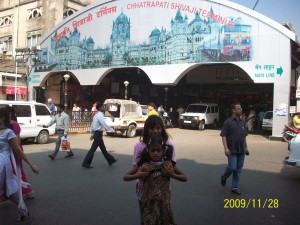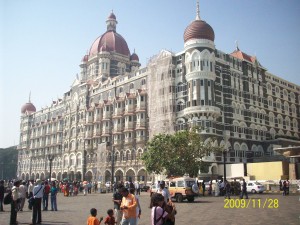Last week I was in Bombay exactly 1 year after the terrorist attacks of a year ago (26/11). I made it a point to visit VT station and the Taj Mahal Hotel (site of two of the terrorist attacks).
VT station was its normal, bustling self. The only signs that anything untoward had happened there was that there was one armed military person behind a stack of bags at one entrance, a few other armed policeman loitering around and strangely enough a bunch of metal detectors at the various entrance and exit points which hardly anyone bothered to walk through. No signs any bullet holes or any indication of any kind of memorial to those 50 odd people who had been killed at this location last November.
The Taj Mahal Hotel (across from the Gateway of India monument) looked exactly the same as it did prior to the terrorist attack of last year which had left several sections of the hotel on fire. The only changes that I saw was the side walk around the Taj was cordoned off and at the main entrance, one had to go through a metal detector and bags were also scanned separately. On walking around inside, I met a Commander Ramamurthy who told me that he was a consultant to the Taj (presumably on security matters). I asked him about any memorial that might be present to remember those dozens of people who had died in the terrorist attack. He directed me towards the Golden Dragon restaurant where most of the killings had taken place and to the adjacent area where some of the terrorists had been killed. However on going to these locations, I could not find a single indication of bullet holes or more importantly any memorial to the tragedy that had taken place at this hotel.
Bottom line – after the terrorist attack of 26/11/2008, people in Bombay had just cleaned up and resumed business as usual at all the locations that had been hit. India had not invaded Pakistan to capture or kill the terrorists (who are clearly based out of there) and so no war had resulted which could have thrown the whole region into a turmoil. But despite this, no further overseas based attacks had taken place a year since 26/11 either because security in Indian cities had been improved so much or just sheer luck or that Pakistan itself was now in turmoil with the home grown terrorist creating havoc there or a combination of all of these.
Compare that to the attacks on NY City of 9/11/2001. Eight years later, the site where the World Trade Center stood is still a hole in the ground as competing interests (including politicians, lawyers, builders and victims’ groups) compete with each other to decide what exactly to build at that location. The place has been given a new name (Ground Zero) and a grand memorial is planned to be located there to honor the victims / heroes that died there on that day. Afghanistan was invaded to eliminate Osama Bin Laden and Al Qaeda but after more than 8 years of war involving more loss of thousands of US lives and billions of dollars in expense, this mission has yet to be accomplished.
Bottom line – the mark that the terrorists made on NY City continues to be there for all to see.
So why has 9/11 had such a different impact than 26/11?
In my opinion following are the reasons:
- India has been used to terrorist attacks and mass deaths due to the same and so 26/11 quickly became just another blip in history while for the US, which considered itself fairly immune to overseas terrorist attacks in recent times, 9/11 was a seriously, unexpected shock
- India was in no position to invade Pakistan (since it is a country possessing nuclear weapons) while Afghanistan had no such weapons to defend itself against a US invasion
- Indian people have not yet developed the individualistic mentality of those in the US and the Indian Government was no compulsion to listen to bunch of people’s opinions as to when to rebuild and how to memorialize those who died in the attacks and so could swiftly move to restore normalcy
So while India has apparently brushed itself from 26/11 and moved on (for better or for worse), the US continues to wallow in the aftermath of 9/11 having failed to rebuild the edifice that was destroyed and getting mired in an unending overseas conflict.
So in which instance did the terrorists win? The answer, at least in the short term, appears to be obvious …..


#1 by Venkatasubramanyans on 2009/12/07 - 5:32 am
Quote
Very well written and realistic article. As indicated Mumbai has survived many such terrorist attacks and the people of Mumbai get back to normal very soon
#2 by Rupa Bose on 2009/12/07 - 11:53 am
Quote
Thanks for this. I think a key difference is what is perceived as a victory. Mumbai prides itself on resilience. After the 1993 blasts, in which the stock exchange was also hit, it was symbolic that trading resumed very soon afterward.
I think some of the negative effects after 9/11 went far beyond the perpetrators’ dreams. They were an auto-immune reaction in the state.
On memorials – I have mixed feelings. I know they’re for the survivors. But if it were me, I would not want to be memorialized in that way, as though the most important thing about my life was the way and the place I left it…
#3 by Robin on 2009/12/07 - 4:34 pm
Quote
Terrorists can only win when the attention they seek becomes focused upon them. Why focus on them at all? Take heed to watch only the terrorists within your own hearts and minds… Is the damage done there any less?
#4 by Shankar on 2009/12/07 - 5:19 pm
Quote
Your blog makes for interesting reading; on the
entry under reference, it seems to me that the
cultural heritage is perhaps the single most
important reason for lack of any memorializing.
Through the hoary past of several millennia, our folks have been quite lax in terms of recording history; only a few heroes are memorialzied in our myths and many such memories are distorted and the heroes deified. In modern India, we have memorials for politicians and cine heroes – and if any of them had died in the Mumbai blast, you can rest assured there would be memorials galore. About the rest of the folks, we really Indians do not seem to worry that much – life just goes on.
Regards. SvAmi sharaNam, SAIRAM.
#5 by Renu on 2009/12/07 - 10:59 pm
Quote
I disagree a little..
terrorist didnt get a victory only because of our attitude..what they wanted was to disrupt life, put a fear into our hearts..but we showed them, we are not scared to run our normal life.
India is still a developing country , with neither so much resource, nor limited population and then with the mixed people here, any stringent action backfires more than works.
We are not paranoid like americans…think that if US couldnt stop them from planning and executing such a big attack, could we do it?
when their attack happened, citizens intead of blaming their govt. and police got into action, and here what we do……..
Our democracy is very vibrant and alive to exist thru multi religious people, the freedom India gives to its citizens is uncomparable despite all these terrorists belonging to a particula community and herein lies our strength.
What is the point of erecting memorials for these sad incidents?
#6 by Ram on 2009/12/22 - 6:47 pm
Quote
Hi Venky – I agree with the reasons you have outlined here for the differential impacts, but strongly disagree with your conclusion as well as the comments of some of the others on this blog. You are measuring victory or defeat by the pace at which the cities return to normalcy, but in my opinion this is nothing but a measure of apathy and negligence. In India we are apathetic to the loss of life – some might paint this in a positive light and call it “Gandhian”, this tendency to “turn the other cheek” when hit, but make no mistake it is just apathy. This apathy is omnipresent in Indian society. I too have lived in the US and have gone back to Bangalore and Mumbai many times, but I see things differently. I see the apathy of cars in traffic that refuse to give way to the ambulance that is struggling to make its way to or from an emergency. I see the apathy of public transport operators who don’t respect pedestrians who are school children and senior citizens, struggling to cross the streets. I see the apathy of the so called “haves” who are rich enough to own dogs, but are not socially conscious enough to pick up their litter when they walk their dogs in public parks and streets. I see the apathy of the middle class who sacrifice to send their kids to the best schools and colleges but who don’t hesitate employing others’ children and teenagers as maids. These are just a few diverse examples – there are so many more, but the all point to the same apathy, not courage or strength, but apathy, which is the reason behind these differences.
#7 by Sumera on 2010/09/02 - 2:43 am
Quote
Hi Venky… great article. I appreciated your insight on 26/11.
Given the different dynamics of US and India, I think that both countries responded to the tragedies in a way which would allow them to be restored and to rebuild as a nation.
#8 by Davin Bernstein on 2012/09/12 - 9:04 am
Quote
Hold on a sec. You are comparing attacks that killed less than 6% of the victims of 9/11, versus an attack that destroyed 4 airplanes, 2 of the tallest buildings in the world plus a significant part of one of the largest office buildings in the world, and you wonder about our obsession with 9/11 compared to attacks on a private hotel and a train station? Really? Plus, given that Americans are not used to terrorist activity on our own soil (compared to 8 acts in Mumbai in the last 10 years), and it is no wonder that we would devote resources to retaliation, defense, and rebuilding. BTW, the Pentagon was fully restored and started being reoccupied less than a year after the attack, at a cost of $500Million. It is an honor to remember the dead, and how much more so than to remember innocent lives. That a hotel and train station fail to do so does not impress me at all.
#9 by Venky Venkatraman on 2012/09/12 - 9:07 am
Quote
With all due respect, I think you missed my point, Davin. Even if the India and US incidents were equivalent (say, Islamic terrorists killed a 100 people at Grand Central Station, another 50 in the Waldorf and more at a synagogue in NY city, the US reaction, I believe, would have been pretty much the same. And as you have correctly pointed out, there have been numerous such terrorist attacks in India, the total toll from the same would far exceed the number of people lost in 9/11. My point is that while the US has the resources and resolve to combat this menace, India (which is considered a “soft state”) cannot and will not make hard decisions to protect its citizens. And while the US makes it a point to memorialize those who died, in India (where the value of human life is much less) they are quickly forgotten. And as Americans, we need to question whether the US with the vast power at its disposal and multiple options to deal with this menace took the right approach post 9/11.